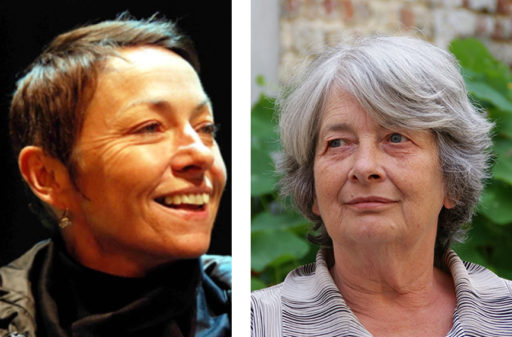
-
NamesIsabelle Stengers, Vinciane Despret
-
TitleCommunity Discussion: What is Scientific Thinking?
-
CategoryLecture
-
DateApr 9, 2015
-
Time7:00 pm
-
Cost
Free
-
Description
As the distinguished Winton Chair visiting scholars at the University of Minnesota for Spring 2015, philosophers Isabelle Stengers and Vinciane Despret will take part in a open community discussion titled What is Scientific Thinking?. This conversation will bring together independent scholars with artists and activists as well as students and faculty in a public forum to discuss a topic that is vital to our 21st century landscape. Bruce P. Braun, Professor, Department of Geography, Environment and Society at the University of Minnesota, and Drew S. Burk, Director and Editor at Univocal Publishing, will moderate.
This discussion is part of the Winton Chair in the Liberal Arts Cornerstone Series with support from Univocal Publishing and Midway Contemporary ArtVinciane Despret
Philosopher at the University of Liège, is trained as a psychologist formatively influenced by ethology, the study of animal behavior. From her first book Savoir des passions, passion de savoir, (Knowledge of Passions, Passion of Knowledge, 1997), she has studied the relationship between knowledge production and animals, in particular the ways in which scientists both change and even produce animal being in their research, and the ways in which animals affect us. Her further work on human psychology and ethology, Quand le loup habitera avec l’agneau (When the Wolf will Live with the Lamb, Le Seuil/Les empêcheurs de penser en rond), connects the study of the natural world with the evolution of human society. In her most recent human anthropological research, Despret considers relationships characterized by other modes of presence, particularly modalities through which humans enter into relationship with the dead. She has been a guest curator for the international exhibit, Bêtes et hommes(Beasts and Men), held in the Great Hall of La Villette, in Paris. She has also received two prizes for her work: the scientific humanities prize, awarded in 2008 by the prestigious French the Institut d’études politiques (Sciences-Po), and the Wernaers International Fund Prize for the research and the diffusion of knowledge.Isabelle Stengers
Philosopher of Science at the Université libre de Bruxelles. Single author of 11 books and countless articles, Stengers has been on the cutting edge of the philosophy of science for over 30 years, starting with her first work, co-authored with Chemistry Nobel Prize Laureate Ilya Prigogine, on time and irreversibility. Since then, she has led a sustained and multi-faceted inquiry into the systems through which we establish knowledge, challenging science’s pretensions to truth, objectivity, and rationality. Among the first scholars of science to consider seriously the work of Foucault and Deleuze, she has also engaged in a ground-breaking critique of psychoanalysis, researched problems in economics and politics, and considered the epistemological and political ramifications of modern-day witchcraft. Most recently her reflections on an “ecological praxis” have reshaped our thinking about environmental catastrophe and humans’ role in the future. Her approach is somewhat “hands-on”; it can be said that she strives to think not about but with her objects of study. Professor Stengers’ model of scholarly production is also thoroughly collaborative: she is the co-author of no fewer than 14 books. Her latest booked, co-signed with philosopher Vinciane Despret, was in fact authored by a collaborative of 11 major thinkers. Recently translated asWomen Who Make a Fuss. The Unfaithful Daughters of Virginia Woolf, the book asks, “How have women changed how we think?”The Winton Chair in the Liberal Arts was established in 1987 by alumna Penny Rand Winton and her husband, David Michael Winton, to encourage innovative, distinctive research in the liberal arts that questions established patterns of thought by bringing diverse, innovative, and engaged scholars, artists, and performers to campus to engage our community in conversation around their work for periods ranging from a few days to a year.
-
